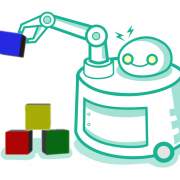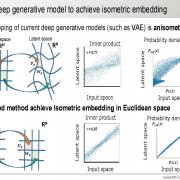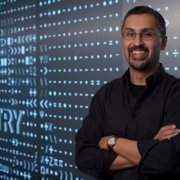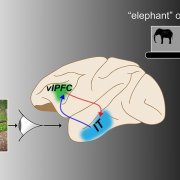December 3, 2020 - 10:45 am
Adding a module that mimics part of the brain can prevent common errors made by computer vision models.
Anne Trafton | MIT News Office
Computer vision models known as convolutional neural networks can be trained to recognize objects nearly as accurately as humans do. However, these models have one significant flaw: Very small changes to an image, which would be nearly imperceptible to a human viewer, can trick them into making egregious errors...
December 1, 2020 - 3:00 pm
Presenters: Prof. Tomaso Poggio (MIT), Prof. Gabriel Kreiman (Harvard Medical School, BCH), and Prof. Thomas...
Abstract: Deep Learning architectures designed by engineers and optimized with stochastic gradient descent on large image databases have become de facto models of the cortex. A prominent example is vision. What sorts of insights are derived from these models? Do the performance metrics reveal the...
November 30, 2020 - 3:15 pm
Google’s deep-learning program for determining the 3D shapes of proteins stands to transform biology, say scientists.
by Ewen Callaway
An artificial intelligence (AI) network developed by Google AI offshoot DeepMind has made a gargantuan leap in solving one of biology’s grandest challenges — determining a protein’s 3D shape from its amino-acid sequence.
DeepMind’s program, called AlphaFold, outperformed around 100 other teams in a biennial...
November 24, 2020 - 10:15 pm
What's SSUP? The Sample, Simulate, Update cognitive model developed by MIT researchers learns to use tools like humans do.
Human beings are naturally creative tool users. When we need to drive in a nail but don’t have a hammer, we easily realize that we can use a heavy, flat object like a rock in its place. When our table is shaky, we quickly find that we can put a stack of paper under the table leg to stabilize it. But while these actions...
November 24, 2020 - 4:00 pm
Prof. Aleksander Mądry, CSAIL, MIT
Abstract: Large-scale vision benchmarks have driven---and often even defined---progress in machine learning. However, these benchmarks are merely proxies for the real-world tasks we actually care about. How well do our benchmarks capture such tasks?
In this talk, I will discuss the alignment...
In this talk, I will discuss the alignment...
November 10, 2020 - 6:00 pm
Dr. Keizo Kato, Fujitsu Laboratories Ltd., and
Dr. Akira Nakagawa, Artificial Intelligence Laboratory,...
Please note change in start time. This research meeting will start at 6pm EST.
Abstract: To analyze high-dimensional and complex data in the real world, deep generative models, such as variational autoencoder (VAE) embed data in a low-dimensional space (latent space) and learn a probabilistic...
Abstract: To analyze high-dimensional and complex data in the real world, deep generative models, such as variational autoencoder (VAE) embed data in a low-dimensional space (latent space) and learn a probabilistic...
November 3, 2020 - 4:00 pm
Nick Roy, CSAIL, AeroAstro, MIT
Abstract: In the last few years, the ability for robots to understand and operate in the world around them has advanced considerably. Examples include the growing number of self-driving car systems, the considerable work in robot mapping, and the growing interest in home and service robots. However...
October 27, 2020 - 4:00 pm
Panelists: Tomaso A Poggio (CBMM), Daniela L Rus (CSAIL), Max Tegmark (Physics), Lorenzo Rosasco (IIT), and...
Abstract: Deep Learning has enjoyed an impressive growth over the past few years in fields ranging from visual recognition to natural language processing. Improvements in these areas have been fundamental to the development of self-driving cars, machine translation and healthcare applications....
October 20, 2020 - 4:15 pm
Recurrent processing via prefrontal cortex, necessary for quick visual object processing in primates, provides a key insight for developing brain-like artificial intelligence.
Alli Gold | School of Science
MIT researchers have identified a brain pathway critical in enabling primates to effortlessly identify objects in their field of vision. The findings enrich existing models of the neural circuitry involved in visual perception and help to...
October 20, 2020 - 4:00 pm
Hosted via Zoom
Prof. Josh McDermott, Laboratory for Computational Audition, MIT
Speaker biography:
Josh McDermott obtained his PhD from MIT in 2006 and returned in January 2013 as an Assistant Professor in the Department of Brain and Cognitive Sciences, moving from Oxford University, where he was a visiting scientist during 2012. Prior to that, he was a research associate at...
Josh McDermott obtained his PhD from MIT in 2006 and returned in January 2013 as an Assistant Professor in the Department of Brain and Cognitive Sciences, moving from Oxford University, where he was a visiting scientist during 2012. Prior to that, he was a research associate at...
October 2, 2020 - 10:30 am
In some situations, asking “what if everyone did that?” is a common strategy for judging whether an action is right or wrong.
Anne Trafton | MIT News Office
Imagine that one day you’re riding the train and decide to hop the turnstile to avoid paying the fare. It probably won’t have a big impact on the financial well-being of your local transportation system. But now ask yourself, “What if everyone did that?” The outcome is much different — the...
September 29, 2020 - 4:00 pm
Profs. Jim DiCarlo, Tomaso A Poggio, and Joshua Tenenbaum
Panel details:
Profs. Jim DiCarlo, Tomaso A Poggio, and Joshua Tenenbaum will discuss and debate the relationship between engineering and science in CBMM and the field:
We all believe that if we want to understand how our brain computes intelligence, we need a synergistic combination of the science...
Profs. Jim DiCarlo, Tomaso A Poggio, and Joshua Tenenbaum will discuss and debate the relationship between engineering and science in CBMM and the field:
We all believe that if we want to understand how our brain computes intelligence, we need a synergistic combination of the science...
September 24, 2020 - 9:15 am
By Jo He-rim (herim@heraldcorp.com)
Hyundai Motor Group said Thursday it has scouted Tomaso Poggio and Daniela Rus, experts on artificial intelligence, to work together on various projects of AI technology development.
Poggio and Rus are serving as technology consultants and have been giving advice on utilizing AI to build planning and technological strategies for new business models, to establish a global research organization and to set...
September 22, 2020 - 4:00 pm
Hosted via Zoom
Dr. Brian Cheung, BCS Computational Fellow, MIT
Abstract: Learning is one of the hallmarks of human intelligence. It marks a level of flexibility and adaptation to new information that no artificial model has achieved at this point. This remarkable ability to learn makes it possible to accomplish a multitude of cognitive tasks without...
September 15, 2020 - 4:00 pm
Hosted via Zoom
Prof. George Em Karniadakis, Brown University
Abstract: It is widely known that neural networks (NNs) are universal approximators of continuous functions, however, a less known but powerful result is that a NN with a single hidden layer can approximate accurately any nonlinear continuous operator. This universal approximation theorem of...












